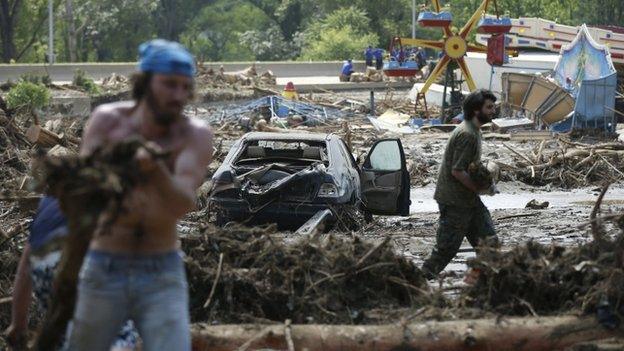Georgia flood: Huge clean-up as search for zoo animals continues
- Published
Floodwaters hit Tbilisi zoo killing three workers there and many animals
"It was nightmare," says George Babalashvili as he reflects on the way Tbilisi Zoo was laid out.
The volunteer, who is helping with the clean-up operation after the weekend's devastating floods, remembers cars driving close to animals and roads passing near to enclosures.
When the zoo was established here in 1927, it was on the outskirts of Tbilisi.
Today it is in the centre of town near to major highways and a roundabout.
'United'
The flood on Sunday submerged half of the zoo, killing hundreds of animals, and the area now looks like a massive construction site.
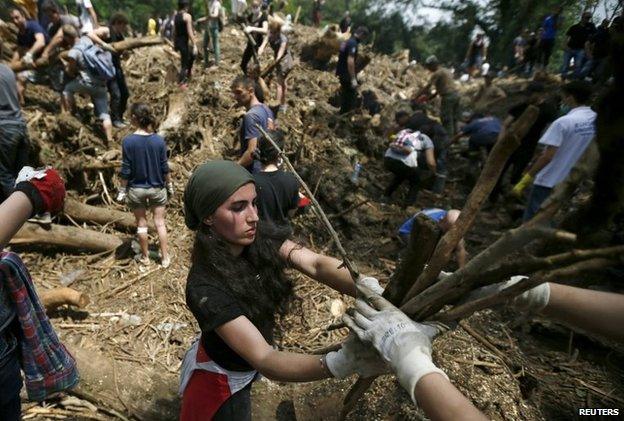
Volunteers clean debris around a buried emergency car
Thick, slimy mud is everywhere. An army of volunteers is digging, scrapping, carrying mud in wheel barrows and flopping it onto piles.
Huge trucks are on site helping to move the debris and the mud away.
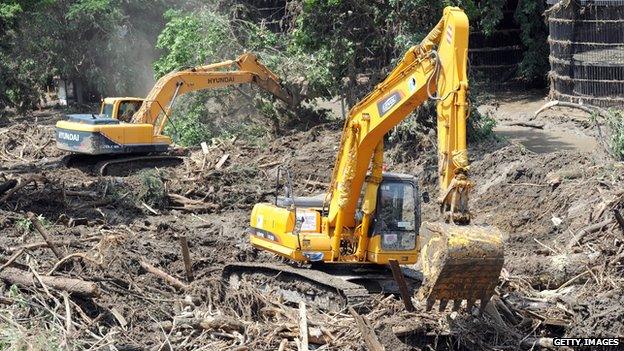
"People feel united in this tragedy. We are here at our own will, because we know that the city needs us," says George.
'Big tragedy'
Tbilisi Mayor David Narmania is also on site, overseeing this major clean-up operation.
As well as volunteers, there are dozens of municipal authority employees here along with government emergency workers and army conscripts.
"It's a big tragedy for us," says the mayor. Nineteen people are now thought to have died, while some are still feared missing and scores of families have lost their homes.
"We have managed to capture some animals that went loose, and we are continuing the search," the mayor adds.
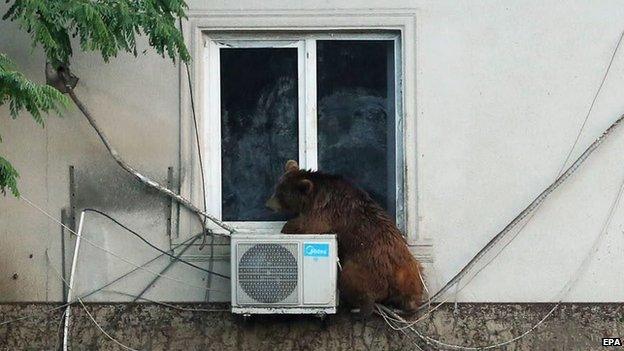
People were told to stay indoors after the animals escaped
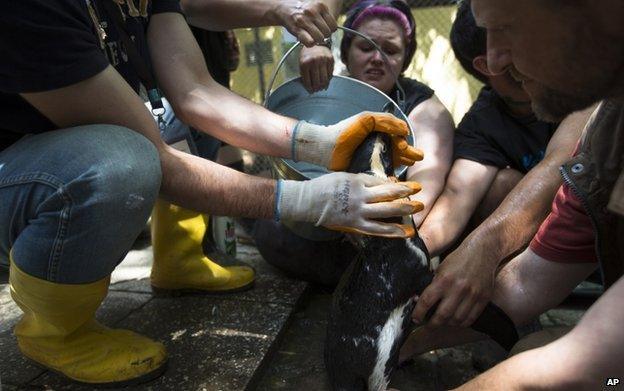
Zoo employees wash the mud from a penguin at the zoo on Tuesday
It is still not clear how many of the 300 animals still unaccounted for have drowned, or how many might still be at large. Tbilisi is surrounded by hills and woods which would be natural area for some of the animals to escape to.
The good news is that some animals including crocodiles and boar have been dug out of the mud alive.
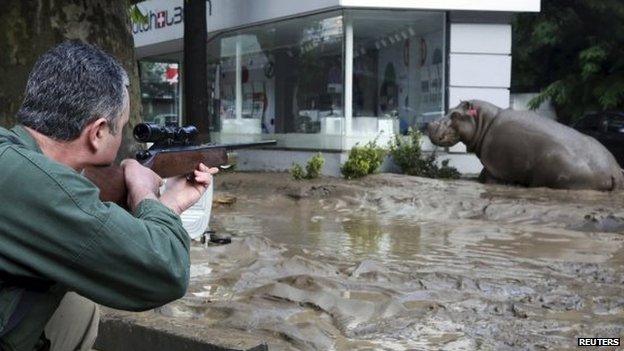
This hippopotamus was tranquilised, but some animals have been killed
But many others are believed to have drowned, including all of the lions and tigers that escaped.
The worst affected part of the zoo was the lower area, once home to bears, tigers and lions kept in special enclosures.
Out of 13 wolves only two survived.
On Sunday, only the peaks of fences surrounding the enclosures could be seen above the muddy water. By Monday, levels had dropped by up to 6m (19.7ft), but there is still a lot of water.
It is only when the area is completely cleared of mud and debris that the authorities will be able to count the total number of dead animals and also have a clearer idea of how many might still be roaming in the vicinity of the capital.
Shooting dead
Plans to relocate the zoo to a much bigger area near a reservoir known as the Tbilisi Sea were made several years ago, but funding had been an issue.
Last year, the newly-elected mayor, Narmania, promised to follow up on these plans. Now it looks like he has no choice.
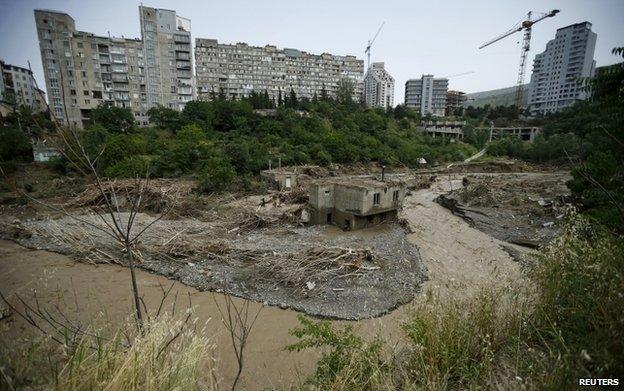
The area affected by the floods was built up, with roads and homes affected
In the wake of the flash flood there was a lot of criticism on social media over the handling of the situation, especially when it came to cases of security services shooting dead some of the escaping animals.
Questions have also been asked about how the construction of a controversial new road, which cuts right through the zoo and neighbouring Mtziuri park, may have affected the river Vere, which burst its banks.
But an engineer-geologist from the ministry of environmental protection, Giorgi Gaprindashvili, says the highway played no role in the devastation.
"In the 1960s the same area got flooded. Back then of course there was no highway there," he says.
The disaster was caused by heavy rain, which caused a large landslide upstream and the River Vere to flood, he says.
"What happened over the weekend is one of the biggest disasters in Tbilisi's recent history."
- Published14 June 2015
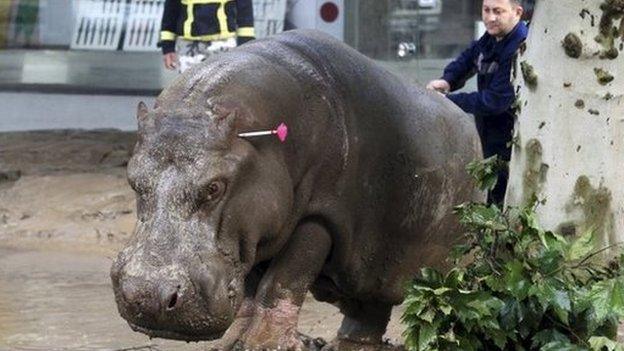
- Published14 June 2015
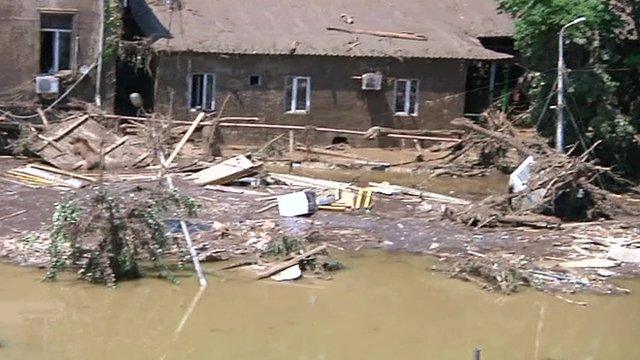
- Published14 June 2015
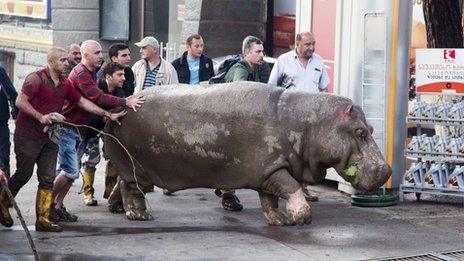
- Published15 June 2015
